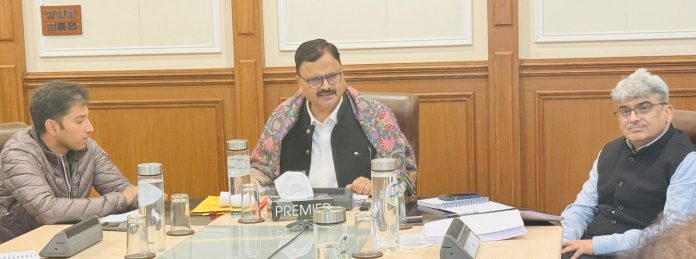Directs for strict adherence to timelines, quality parameters
JAMMU: Minister for Tribal Affairs, Jal Shakti, Forest, Ecology & Environment, Javed Ahmed Rana today chaired a high-level meeting at the Civil Secretariat here to review implementation of Tribal Welfare schemes across Jammu and Kashmir.
The meeting was attended by Chief Secretary Atal Dulloo; Secretary Tribal Affairs, Prasanna Ramaswamy G; District Development Commissioners of Jammu Division, Director Tribal Affairs, J&K and other senior officers.
During the review, the Minister took a detailed appraisal of both physical and financial progress achieved under various schemes, assessed outcomes against the set objectives, and examined timelines for completion to ensure effective delivery of welfare initiatives for tribal communities.
The schemes discussed in meeting included UT Capex Budget, Special Central Assistance to Tribal Sub-Scheme (SCA to TSS), Pradhan Mantri Adi Adarsh Gram Yojana (PMAAGY), Dharti Abha Janjatiya Gram Utkarsh Abhiyan (DA-JGUA), and Pradhan Mantri Van Dhan Yojana (PMVDY).
Emphasizing the need for efficient utilization of resources, the Minister directed all officers to ensure strict compliance with quality standards and timelines.
He underscored that governance must be outcome-oriented, stressing the importance of regular monitoring, seamless execution, and timely completion of projects to deliver tangible benefits on the ground.
“The original objectives of these flagship programmes must be realized in their true spirit to ensure maximum benefit to the tribal population,” the Minister asserted.
He reiterated that the Omar Abdullah-led government is committed to socio-economic upliftment of tribal communities through sustained implementation of welfare schemes and policy interventions.
Highlighting the importance of knowledge-based and innovative approaches in tribal development, Rana called for greater collaboration between the Tribal Research Institute (TRI) and IIT Jammu in the fields of research, documentation, and preservation of the historical and cultural heritage of tribal communities. Such partnerships, he noted, would help build an authentic repository of tribal knowledge and foster innovation in developmental planning.
The Minister also emphasized the need to involve local poets, artists, and cultural practitioners in initiatives promoting tribal art, culture, and languages, adding that community participation is essential for ensuring sustainable and meaningful outcomes.
Laying special focus on improving tribal hostels across Jammu and Kashmir, Rana instructed concerned officers to work in mission mode for timely renovation and upgradation.
He stressed that hostels must provide safe, comfortable, and well-equipped environment to facilitate academic and personal growth of students from tribal communities.
Further, the Minister directed that all Detailed Project Reports (DPRs) be prepared in accordance with actual field requirements and realistic assessments, ensuring effective planning and quality outcomes.
Speaking during the meeting, Chief Secretary, Atal Dulloo observed that the Government of India has laid renewed emphasis on tribal development through various flagship schemes.
He called for coordinated efforts and mission-mode implementation to ensure that the benefits reach the intended beneficiaries efficiently and effectively.


